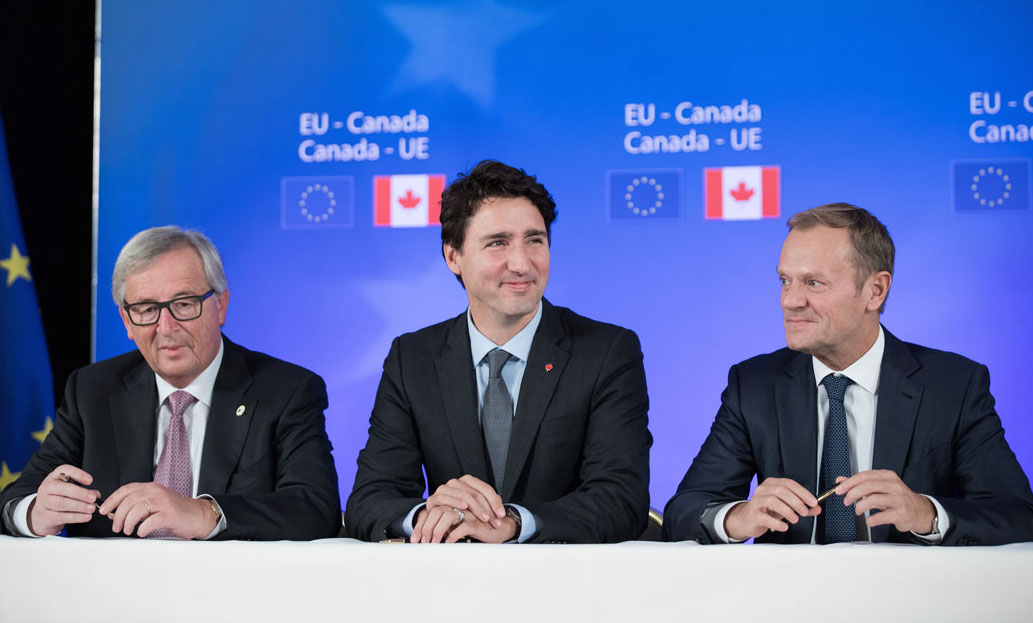The trouble with demonizing the leader of an unpopular government is that it gives the next leader way too much slack. I remember writing a column years ago comparing the hated Brian Mulroney with Paul Martin (who more or less ran Jean Chretien’s government). Who was more destructive to the public interest and progressive government? Conventional wisdom would say Mulroney. But, while Mulroney’s “free trade” agreement set the stage for the remaking of Canada, it was nice-guy Paul Martin who did the deed. He slashed federal social spending by 40 per cent, eliminated any strings attached to federal transfers (setting up huge cuts to welfare programs), and implemented the largest tax cuts for the wealthy and corporations in Canadian history.
And now we have Justin “sunny ways” Trudeau who presents as great a personality contrast as one can imagine to the grim and heartless Stephen Harper. And there is no doubt that on many symbolic issues the Liberal prime minister has provided welcome relief from the ravages of the right-wing libertarian Mr. Harper.
But when it comes to the ideological commitment to trade and investment liberalization, Mr. Trudeau is easily a match for his predecessor, cementing the history of the Liberal party as the party of “free trade.” This week he was in Ireland pushing CETA — the Canada-EU deal.
Key changes to procurement
Throughout the Harper era, notwithstanding Harper’s dogged commitment to these deals, the Conservative government managed to actually take a very good position on one enormously important aspect of the neoliberal agenda: government procurement. The ability of the federal, provincial and municipal governments to favour Canadian suppliers of goods and services was protected in NAFTA and all of the many bilateral agreements signed by Canada under Harper. Until CETA.
This was important not just because of the opportunities for local job creation but also for local businesses. B.C., for example, under the NDP, had a program called “First Contract” by which provincial procurement departments could give a first contract to a local company specifically to give it a chance to build its experience and capacity — waiving the normal low-bid rules.
Under CETA that would be explicitly prohibited because for the first time, provincial procurement and that of the so-called MASH sector — municipal, academic, schools and hospitals — will be completely open to procurement competition from companies in 28 EU countries.
What are the implications? According to trade lawyer Roy Nieuwenburg:
“Procurements by MASH entities would become more scrutinized and more susceptible to challenge. MASH entities would have to comply with stringent measures designed to ensure transparency and compliance. Disappointed bidders would have enforceable recourse. Remedies could include monetary awards and re-opening the outcome of bidding processes.”
One example from federal jurisdiction saw Corel successfully challenge the winning government contract bid of Microsoft in a Canadian International Trade Tribunal. It won a $9.9-million award.
Not only would local suppliers of goods and services be disadvantaged in bidding against giant EU companies — and municipal governments disempowered — the administrative burden on small to medium municipalities in dealing seriously with potentially dozens of bids from two dozen countries will be nightmarish.
Another potential victim: a relatively new but rapidly growing sector that is focussed on building up food security through the purchase of local food production. Four provinces — Ontario, Quebec, British Columbia and Nova Scotia — are promoting the production and purchase of local food. Cities — and MASH sector institutions — are also pioneering efforts to support the public procurement of local food. CETA could seriously undermine these initiatives, which openly favour local producers.
What does Canadian business gain? Not much.
As with virtually all these so-called trade agreements, their zealous proponents in the trade department of the federal government sing the praises of the billions of dollars in opportunities for Canadian companies — billions calculated through economic models with no relationship to reality. Business itself does not share the enthusiasm of this free trade priesthood. According to Matthew Wilson, vice president of Canadian Manufacturers & Exporters, very few Canadian companies are anywhere near ready to take advantage of access to the $16.5-trillion EU market. The numbers tell the story: of approximately one million small and medium businesses in Canada just 10,000 currently export outside the U.S.
But the kicker in the whole procurement part of CETA is that Canada already has complete and open access to the EU’s MASH sector. Unbelievably — and inexcusably — Canada gave unfettered access to this sector and got absolutely nothing in return. In fact, the Europeans were so dumbfounded by their good fortune they were almost giddy. In an EU document analyzing CETA, the authors all but called Canada a complete sucker — stating they had won concessions far beyond their expectations:
“As regard market access the Canadian offer is the most ambitious and comprehensive Canada has yet made to a third party. For the first time Canadian provinces and municipalities will open their procurement to a foreign partner going well beyond what Canada has offered before.”
Municipal representatives should be shouting from their rooftops about this assault on their economic and social development authority. Where is the Federation of Canadian Municipalities on this issue — and where have they been all along? Do the mayors of Canada — especially those of the large cities where the first challenges are likely to arise — have any idea of the implications of CETA? If they do, they seem inexplicably quiescent.
The Trudeau government could have nixed the procurement chapter but chose not to. Is there a chance that the new kid on the block, B.C. NDP premier-designate John Horgan, might throw a last-minute monkey wrench into this destructive machinery?
I know you’re busy, Mr. Horgan, but this act alone could establish your legacy.
Murray Dobbin has been a journalist, broadcaster, author and social activist for 40 years. He writes rabble’s State of the Nation column.




